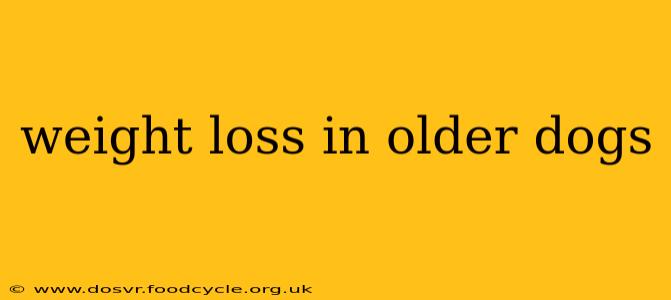Weight management is crucial for dogs of all ages, but it takes on a special significance as our canine companions enter their senior years. Older dogs often face unique metabolic changes and health challenges that can lead to weight gain, impacting their overall health and quality of life. This comprehensive guide explores the common causes of weight gain in older dogs, effective weight loss strategies, and crucial considerations for maintaining a healthy weight throughout their golden years.
Why is My Older Dog Gaining Weight?
Several factors contribute to weight gain in senior dogs. Understanding these underlying causes is the first step towards developing an effective weight loss plan.
-
Decreased Activity Levels: As dogs age, they naturally become less active. Reduced playtime, shorter walks, and decreased overall mobility can lead to a caloric surplus, resulting in weight gain.
-
Metabolic Changes: Metabolism slows down with age, meaning the body burns fewer calories at rest. This metabolic slowdown can contribute to weight gain even if the dog's food intake remains the same.
-
Hormonal Imbalances: Hormonal changes associated with aging can influence appetite and metabolism. Conditions like hypothyroidism (underactive thyroid) are common in older dogs and can lead to weight gain.
-
Underlying Health Issues: Certain medical conditions, such as Cushing's disease, diabetes, and osteoarthritis, can contribute to weight gain. These conditions often require veterinary intervention to manage effectively.
-
Dietary Factors: Overfeeding, inappropriate food choices (high in calories and fat), and frequent treats can all contribute to excess weight in older dogs.
How Can I Help My Older Dog Lose Weight Safely?
Weight loss in senior dogs requires a carefully planned approach that considers their age, health status, and individual needs. A gradual weight loss program is safer and more effective than drastic measures.
-
Veterinary Consultation: Before initiating any weight loss plan, consult your veterinarian. They can assess your dog's overall health, rule out any underlying medical conditions, and recommend a safe and effective weight loss strategy. They can also help determine a safe rate of weight loss, usually around 1-2% of their body weight per week.
-
Dietary Adjustments: Your veterinarian may recommend a prescription diet formulated for weight management in senior dogs. These diets are often lower in calories and fat while maintaining essential nutrients. Portion control is also critical. Measure your dog's food carefully and avoid free feeding.
-
Increased Physical Activity: While strenuous exercise may not be suitable for all senior dogs, moderate activity is crucial. Short, frequent walks, gentle playtime, and even simple games like fetch (modified to suit their abilities) can help burn calories and maintain muscle mass. Always consult your vet before significantly increasing your dog's activity level.
-
Monitoring Progress: Regularly weigh your dog and monitor their body condition score (BCS). Your veterinarian can teach you how to assess your dog's BCS, which provides a visual assessment of their body fat. Adjust the diet and exercise plan as needed based on their progress.
What are the Potential Risks of Obesity in Older Dogs?
Obesity in older dogs significantly increases the risk of various health problems, including:
-
Osteoarthritis: Excess weight puts extra strain on joints, exacerbating osteoarthritis and causing pain and mobility issues.
-
Diabetes Mellitus: Obesity increases the risk of developing diabetes, a serious metabolic disorder.
-
Cardiovascular Disease: Obesity can lead to heart problems and high blood pressure.
-
Respiratory Problems: Excess weight can make breathing more difficult.
-
Cancer: Some studies suggest a link between obesity and certain types of cancer in dogs.
What Kind of Food is Best for Weight Loss in Older Dogs?
The best food for weight loss in older dogs is a veterinarian-recommended prescription diet formulated for weight management in senior dogs. These diets are specially formulated to provide the necessary nutrients while being lower in calories and fat. Avoid human food and table scraps. These often contain high levels of fat, salt, and sugar, which can hinder weight loss efforts.
How Long Does it Take for an Older Dog to Lose Weight?
The time it takes for an older dog to lose weight varies greatly depending on several factors, including the dog's initial weight, the severity of obesity, their metabolic rate, and the effectiveness of the weight loss plan. A gradual weight loss of 1-2% of body weight per week is generally considered safe and effective. Be patient and consistent, and celebrate small victories along the way. Regular check-ups with your vet are essential to monitor progress and make any necessary adjustments to the plan.
Can My Older Dog Exercise Too Much?
Yes, even moderate exercise can be harmful to older dogs with underlying health conditions. Always consult your veterinarian before starting a new exercise program. Overexertion can worsen existing conditions like arthritis or heart problems. Start slowly, gradually increasing the duration and intensity of exercise based on your dog's tolerance and your veterinarian's recommendations. Remember, the goal is to improve fitness, not to exhaust your dog.
Remember, successful weight loss in older dogs requires patience, consistency, and a close partnership with your veterinarian. By following a carefully planned approach, you can help your senior dog achieve and maintain a healthy weight, improving their overall health and quality of life.
